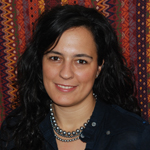Anthropology graduate student receives fellowships to study water rights

Anthropology graduate student receives fellowships to study water rights
- December 5, 2007
- Findings may lead to methods for improving water access to poorer populations
-----
 Growing up in Costa Rica, a Central American country with more than 50% of its borders
comprised of coastline, the contested notion of water access as a basic human right
is a no-brainer for Andrea Ballestero. Now a second year anthropology graduate student,
the topic is a driving force behind her research.
Growing up in Costa Rica, a Central American country with more than 50% of its borders
comprised of coastline, the contested notion of water access as a basic human right
is a no-brainer for Andrea Ballestero. Now a second year anthropology graduate student,
the topic is a driving force behind her research.
With recently awarded fellowships from the Center for Unconventional Security Affairs
at UC Irvine and the Wenner-Gren Foundation for Anthropological Research, Ballestero
will soon be travelling to Costa Rica to study one community's innovative system of
water pricing based on the purchasing power of the people.
"In Costa Rica, you have people and whole communities with greatly varied economic
means," says Ballestero, explaining that those people and communities on the lower
end of the spectrum often lack the funds to pay for such necessities as access to
clean drinking water, the absence of which leads to a host of issues experienced not
only in Costa Rica, but around the world.
One small coastal Costa Rican community appears to have come up with a solution to
this international problem, and it is here where Ballestero will focus the first part
of her study.
"Working together with a national regulatory agency, the community of Cocles was able
to take advantage of a newly restructured national tariff and subsidy system by which
water is priced and charged," she explains. "Under the new system, the community was
able to reclassify a certain percentage of their population who fell under the poverty
line so that they would be eligible for the national subsidy to help cover their water
bill."
Beginning January 2008, she will travel to Cocles and conduct interviews and surveys
within the small community to determine whether or not the program has been and may
continue to be successful in improving water access to poorer populations. She will
then travel to Northeastern Brazil where she will conduct a similar study.
Findings from both case studies may then be applied to the development of similar
models for other communities across the world facing the same crisis.
"I believe water, as many other things in our life, goes beyond imagined borders that
we create. The challenge I have set for myself is to go beyond those borders and put
together people and ideas that might have been considered irreconcilable," Ballestero
says. For her efforts, Ballestero was a co-recipient of the School of Social Sciences'
2007 Outstanding Graduate Student Award for Service.
"This kind of imagination might help find solutions to the fact that 4 out every 10
people in the world lack access to the water that we take for granted in our daily
lives in the cities."
UPDATE: Ballestero received additional fellowships and grants in 2008 from the UC
Irvine Urban Water Research Center and National Science Foundation to fund her research.
-----
Would you like to get more involved with the social sciences? Email us at communications@socsci.uci.edu to connect.
Share on:
Related News Items
- Careet RightNotes from a future professor
- Careet RightCan Opportunity Zones ever meet their poverty-fighting promise?
- Careet RightFei Yuan named one of ten global China Times Young Scholar Fellows
- Careet Right'Wired for Words: The Neural Architecture of Language,' an excerpt
- Careet RightEveryone's looking for a partner who has these 3 traits, according to research


